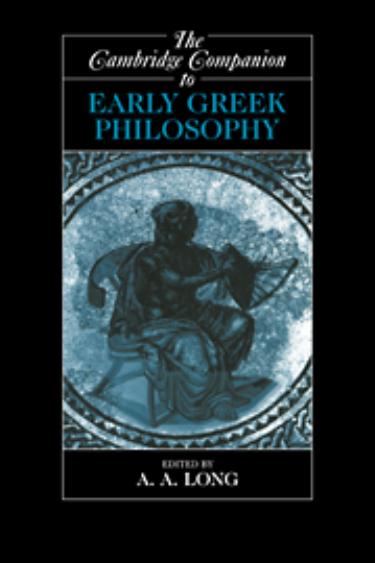The Cambridge Companion to Early Greek Philosophy by A. A. Long

Author:A. A. Long [A. A. Long]
Language: eng
Format: epub, pdf
ISBN: 9780521441223
Publisher: Cambridge University Press
NOTES
A version of this chapter has already appeared as part of the chapter “Anaxagoras and the Atomists” in C. C. W. Taylor, ed. Routledge History of Philosophy, Vol. I, From the Beginning to Plato (London, 1997), and material from it also appears in The Atomists, text and translation by C. C. W. Taylor (Toronto, 1999). Permission from these publishers to reprint Mr Taylor’s work is gratefully acknowledged.
1 For Democritus’ poetics, which falls outside the scope of this chapter, see Most in this volume p. 339.
2 To adapt Aristotle’s example (Metaph. 1.4 985b18-19), AN differs from NA in ordering, and AN from AZ in orientation within a given ordering.
3 While most of the ancient sources agree that atoms are too small to be perceptible, some late sources indicate that some atoms are very large (even on one account “as big as a world”). It seems to me most likely that the atomists held that, while there are atoms of all possible sizes (for the same reason that there are atoms of all possible shapes), all the atoms in our world are too small to be perceived. See Barnes [14] ch. 17 (b).
4 For a full discussion of the atomists’ use of this principle, see S. Makin, Indifference Arguments (Oxford and Cambridge, MA, 1993).
5 Plutarch states this maxim in what is presumably the atomists’ own terminology: “The thing no more is than the no-thing,” where “thing” represents the word den, an artificial formation specifically coined to contrast with mêden, “nothing,” itself etymologically equivalent to mêd’ hen “not one [sc. thing].”
6 For a fuller discussion, see Sedley [409].
7 On the nature of these, see p. 187.
8 In Aristotle’s system natural motion is motion that is intrinsic to the nature of a thing of a certain kind, for example, it is natural for a stone to move downwards, that is, to fall to the earth when unsupported. Things may also be caused, by the exercise of external force, to move in ways contrary to their natural motion, for example, a stone may be thrown upwards. The atomists’ thesis that all atomic motion is the product of precedent atomic interaction, is thus in Aristotle’s terms equivalent to the thesis that all atomic motion is unnatural, a claim that he held to be incoherent (since the concept of unnatural motion presupposes that of natural motion).
9 See Kline and Matheson [403] and Godfrey [404]. I. M. Bodnár, “Atomic Independence and Indivisibility,” Oxford Studies in Ancient Philosophy 16 (1998), 35–61, argues (at 49–53) that, rather than providing evidence for the actual views of the atomists, the texts of Philoponus are mere guesses prompted by his interpretation of the Aristotelian texts on which he is commenting.
10 Restrictions of space preclude discussion of various questions about the nature of atoms that have been the subject of much scholarly dispute. The vexed question of whether atoms have weight is discussed by numerous writers, most fully by O’Brien [407], with cogent criticism by Furley [408]. On the questions of whether, and in what sense, atoms may be said to have parts, see for example, Barnes [14] ch.
Download
The Cambridge Companion to Early Greek Philosophy by A. A. Long.pdf
This site does not store any files on its server. We only index and link to content provided by other sites. Please contact the content providers to delete copyright contents if any and email us, we'll remove relevant links or contents immediately.
The remains of the day by Kazuo Ishiguro(8961)
Tools of Titans by Timothy Ferriss(8357)
Giovanni's Room by James Baldwin(7313)
The Black Swan by Nassim Nicholas Taleb(7097)
Inner Engineering: A Yogi's Guide to Joy by Sadhguru(6780)
The Way of Zen by Alan W. Watts(6589)
Asking the Right Questions: A Guide to Critical Thinking by M. Neil Browne & Stuart M. Keeley(5747)
The Power of Now: A Guide to Spiritual Enlightenment by Eckhart Tolle(5740)
The Six Wives Of Henry VIII (WOMEN IN HISTORY) by Fraser Antonia(5492)
Astrophysics for People in a Hurry by Neil DeGrasse Tyson(5172)
Housekeeping by Marilynne Robinson(4430)
12 Rules for Life by Jordan B. Peterson(4298)
Double Down (Diary of a Wimpy Kid Book 11) by Jeff Kinney(4257)
The Ethical Slut by Janet W. Hardy(4235)
Skin in the Game by Nassim Nicholas Taleb(4231)
Ikigai by Héctor García & Francesc Miralles(4228)
The Art of Happiness by The Dalai Lama(4118)
Skin in the Game: Hidden Asymmetries in Daily Life by Nassim Nicholas Taleb(3985)
Walking by Henry David Thoreau(3948)
